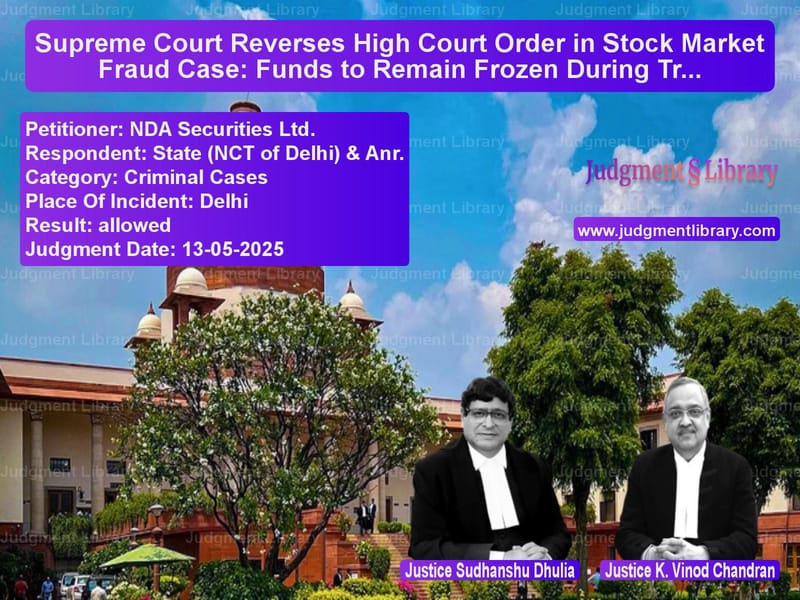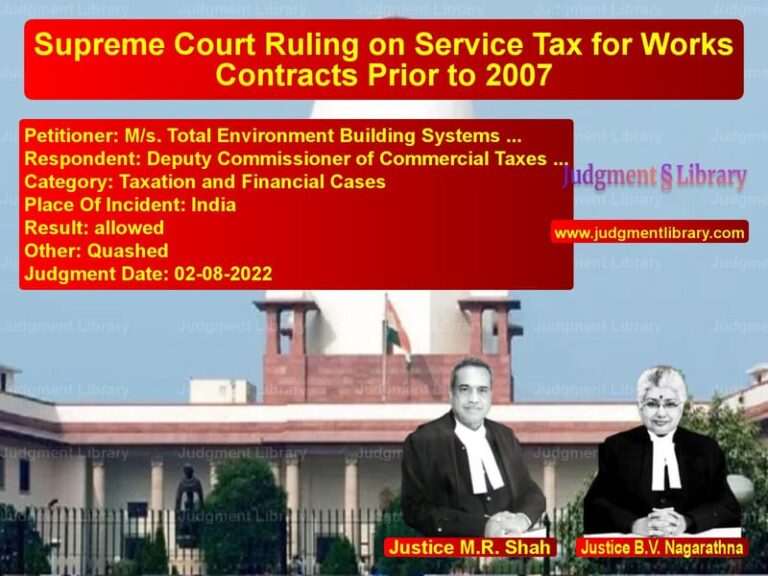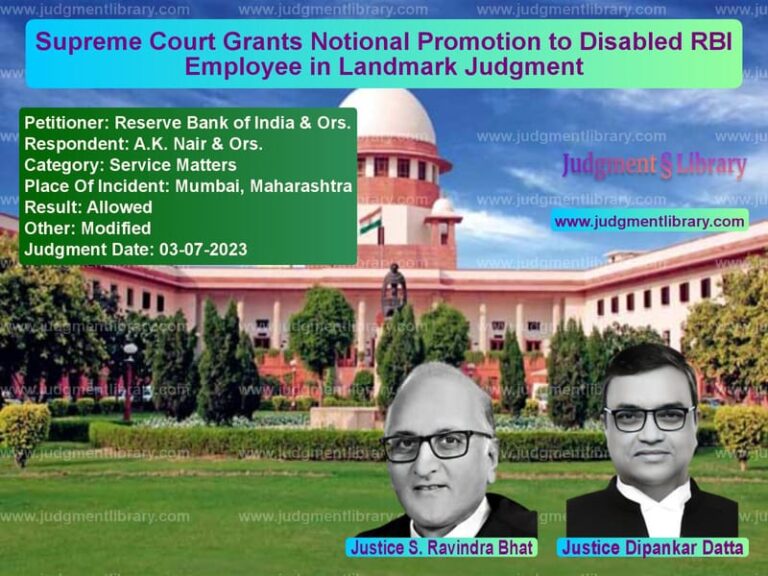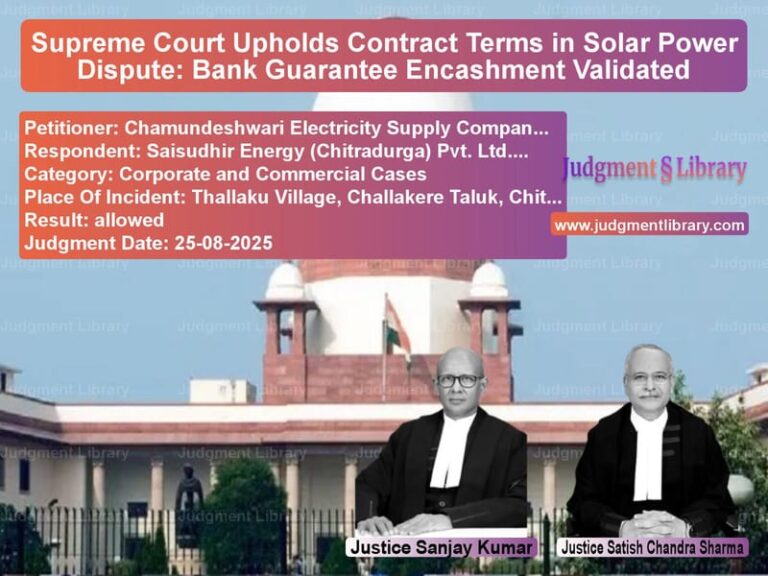Supreme Court Reverses High Court Order in Stock Market Fraud Case: Funds to Remain Frozen During Trial
In a significant ruling that clarifies the limits of High Court jurisdiction in criminal matters, the Supreme Court recently set aside a Delhi High Court order that had directed the release of funds involved in an alleged stock market fraud case. The judgment emphasizes that courts must exercise restraint when dealing with ongoing criminal investigations and should not preemptively decide matters that are still under police scrutiny. The case involves a complex web of alleged impersonation and securities fraud that has been winding through the Indian legal system for nearly a decade, highlighting the challenges of regulating financial markets and protecting investors from sophisticated fraud schemes.
The legal dispute centers around NDA Securities Ltd., the appellant company, and respondent no. 2, another securities trading company. Both companies are registered with the Bombay Stock Exchange (BSE), India’s premier stock exchange. The case originated from events dating back to April 1, 2013, when NDA Securities received a phone call from someone impersonating their client, Brij Mohan Gagrani, instructing them to purchase one lakh shares of Ashutosh Paper Mills Ltd. The company executed the purchase order, but when they subsequently contacted the real Brij Mohan Gagrani to confirm the transaction, he denied having made any such call. This raised immediate red flags about a potential fraud scheme targeting the securities firm.
The Fraud Allegations and Investigation
Following the suspicious transaction, NDA Securities filed a complaint that led to the registration of an FIR on August 7, 2015, under Sections 420 (cheating) and 120B (criminal conspiracy) of the Indian Penal Code. The company alleged that one of their agents, Ashish Agarwal, had connived with the seller of the shares to defraud the company. The immediate response was to request the Bombay Stock Exchange to stop payment to the seller of the shares pending investigation.
The subsequent police investigation revealed that approximately 72,000 shares worth Rs. 15.90 lakhs had been sold by respondent no. 2 company. A chargesheet was filed against Amit Jain, who was identified as the person who allegedly made the fraudulent phone call impersonating Brij Mohan Gagrani. The chargesheet identified Jain as the main accused while noting that respondent no. 2 appeared to be the main beneficiary of the fraudulent transaction. Crucially, the investigation remained incomplete because Amit Jain was absconding, and the chargesheet specifically stated that the role of respondent no. 2 could only be properly ascertained once the main accused was arrested and interrogated.
This investigative gap became the central point of contention in the legal proceedings that followed. With the main suspect unavailable for questioning, law enforcement authorities could not definitively determine whether respondent no. 2 was an innocent third party that had legitimately sold shares or a willing participant in the alleged fraud scheme.
The Legal Battle Over Frozen Funds
As the investigation stalled due to the main accused’s disappearance, respondent no. 2 grew increasingly impatient about accessing the Rs. 15.90 lakhs that remained frozen with the Bombay Stock Exchange. The company filed an application before the Magistrate Court seeking release of these funds, arguing that they had legitimately sold shares and should not be penalized indefinitely due to an ongoing investigation where their involvement remained unproven.
The Magistrate Court dismissed this application on September 16, 2016, holding that since the role of respondent no. 2 was still under investigation, releasing the funds would be premature. The court emphasized that until the investigation was finalized, the frozen funds should remain with the exchange to preserve the status quo and ensure that if fraud was established, the victim company could potentially recover its losses.
Respondent no. 2 then pursued a revision petition against the Magistrate’s order, but this too was dismissed on December 8, 2016, by the Revisional Court. The Revisional Court observed that releasing the funds would impact the rights of the appellant company and directed that the investigation be expedited. This left respondent no. 2 with one remaining legal option – approaching the High Court under Section 482 of the Criminal Procedure Code, which grants High Courts inherent powers to make such orders as may be necessary to prevent abuse of the process of any court or otherwise to secure the ends of justice.
The High Court’s Controversial Decision
The Delhi High Court, in its order dated February 25, 2025, took a different view from the lower courts and allowed respondent no. 2’s petition. The High Court directed the release of the sale value of the shares in favor of respondent no. 2, effectively unfreezing the Rs. 15.90 lakhs that had been held by the Bombay Stock Exchange for nearly a decade.
In its reasoning, the High Court observed that “the role of respondent no. 2 as being party to the fraud cannot be ascertained as of now.” The court further held that “respondent no. 2 put his shares on the market genuinely and the sale value of these shares cannot be denied to him merely because of the fraud played on the appellant.”
This decision immediately raised concerns for NDA Securities, which appealed to the Supreme Court, arguing that the High Court had overstepped its jurisdiction and potentially prejudiced both the ongoing investigation and their ability to recover losses if the fraud allegations were proven.
The Supreme Court’s Analysis and Reasoning
The Supreme Court bench comprising Justices Sudhanshu Dhulia and K. Vinod Chandran began its analysis by reiterating established legal principles regarding the exercise of inherent jurisdiction under Section 482 of the Criminal Procedure Code. The court emphasized that “it is a settled position of law that while exercising the inherent jurisdiction under section 482 CrPC, the High Court is not supposed to conduct a mini trial,” citing precedents from Central Bureau of Investigation v. Aryan Singh & Ors. (2023) and Dharambeer Kumar Singh v. The State of Jharkhand & Anr. (2025).
The Supreme Court expressed strong disagreement with the High Court’s approach, stating that “it is our considered opinion that the High Court has travelled beyond its inherent jurisdiction under Section 482 CrPC, by allowing the petition filed by respondent.” The court particularly objected to the High Court’s observations about respondent no. 2’s lack of involvement in the fraud, noting that “the High Court ought not to have made any observations regarding the absence of any role played by respondent no. 2 in the whole transaction because investigation is yet to be completed.”
The Supreme Court highlighted the critical fact that “the charge sheet itself states that the main accused (Amit Jain) is absconding and the role of respondent no. 2 can only be ascertained once the main accused is arrested.” This investigative reality made any definitive conclusions about respondent no. 2’s innocence or guilt premature.
The court further reasoned that “considering the same, we are of the opinion that the release of the sale value of the concerned shares in favour of respondent no. 2, may cause an irreparable loss to the appellant and vitiate the entire investigation.” This concern about preserving the status quo during ongoing investigations reflects a fundamental principle of criminal procedure – that potential evidence or proceeds of crime should not be dispersed while their true nature remains under examination.
The Supreme Court made several crucial observations about respondent no. 2’s position in the case, noting that “in the present case it is pertinent to note that respondent no. 2 was the main beneficiary of the alleged fraudulent transaction.” The court referenced the chargesheet’s statement that “the role of respondent no. 2 cannot be ruled out” and emphasized that “the role of respondent no. 2 has yet to be ascertained and a clear picture would emerge only after the investigation.”
In one of its most significant statements, the Supreme Court declared that “it is therefore premature to give a clear chit to respondent no. 2 and hold that he is entitled to the sale value of the shares sold by him, especially when the market value is negligible.” This observation about the shares having negligible market value is particularly telling, as it suggests the transaction may not have been a routine arms-length market transaction.
The court concluded this line of reasoning by stating that “when the investigation is still underway, releasing the sale value of the shares will frustrate the investigation.” The Supreme Court endorsed the approach taken by both the Magistrate Court and the Revisional Court, noting that they “have rightly held that the funds in question cannot be released at this stage” and that “the High Court should not have disturbed these findings.”
The Supreme Court’s Final Ruling
Based on its analysis, the Supreme Court unequivocally set aside the High Court’s order, stating that “thus, in our opinion, the order dated 25.02.2025, passed by the High Court deserves to be set aside.” The court was careful to clarify that “we make it clear that we make no observations on the merits of the case” and directed that “the Trial Court is directed to proceed with the trial expeditiously.”
The Supreme Court allowed the appeal and specifically ordered that “the sale value of the shares sold by respondent no. 2 (amounting to Rs. 15.90 lakhs) shall be kept with the BSE during the pendency of the trial, meanwhile.” This restoration of the status quo ensures that the funds remain available should they be needed for restitution if the fraud allegations are proven, while also preserving them as potential evidence in the ongoing criminal case.
Broader Implications for Financial Fraud Cases
This judgment has significant implications for how courts handle financial fraud cases, particularly those involving complex transactions in regulated markets like stock exchanges. By reversing the High Court’s order, the Supreme Court has reinforced several important legal principles that balance the rights of alleged victims, investigating authorities, and parties whose involvement remains uncertain.
First, the judgment reaffirms that courts must exercise restraint when dealing with ongoing criminal investigations. The inherent powers under Section 482 of the CrPC are extraordinary and should not be used to short-circuit established investigative processes. When police authorities are still actively working to uncover the truth, judicial interventions that preempt their findings can undermine the entire investigative framework.
Second, the ruling emphasizes the importance of preserving the status quo in financial fraud cases. Frozen assets or funds often represent the only practical means through which victims can potentially recover their losses if fraud is established. Prematurely releasing such funds can effectively deny victims any meaningful recourse, even if they ultimately prove their case in court.
Third, the judgment acknowledges the practical realities of complex financial investigations. Unlike straightforward criminal cases, financial fraud often involves multiple layers of transactions, intermediaries, and beneficiaries. Determining who knew what and when requires careful, methodical investigation that cannot be rushed or preempted by judicial assumptions about parties’ innocence or guilt.
Fourth, the Supreme Court’s decision serves as an important reminder about the limited role of courts at different stages of criminal proceedings. While courts have a duty to prevent undue hardship to parties, they must also recognize that criminal investigations necessarily involve temporary inconveniences and uncertainties. Balancing these competing interests requires judicial wisdom and restraint.
For participants in financial markets, this judgment provides greater certainty about how courts will handle disputes involving frozen assets during ongoing investigations. Companies engaged in securities trading can have more confidence that if they become victims of fraud, the legal system will protect their ability to potentially recover losses by preserving relevant assets until investigations are complete.
The case also highlights the challenges that stock exchanges and other financial intermediaries face when caught between competing claims during fraud investigations. By upholding the Bombay Stock Exchange’s retention of the disputed funds, the Supreme Court has affirmed the important role these institutions play in maintaining market integrity and supporting law enforcement efforts.
As financial markets become increasingly complex and digital, cases like this will likely become more common. The Supreme Court’s clear principles for handling such disputes provide valuable guidance for lower courts, investigating agencies, and market participants alike. The judgment strikes an appropriate balance between protecting the rights of potentially innocent third parties and ensuring that fraud investigations can proceed effectively without judicial interference that might compromise their outcome.
Petitioner Name: NDA Securities Ltd..Respondent Name: State (NCT of Delhi) & Anr..Judgment By: Justice Sudhanshu Dhulia, Justice K. Vinod Chandran.Place Of Incident: Delhi.Judgment Date: 13-05-2025.Result: allowed.
Don’t miss out on the full details! Download the complete judgment in PDF format below and gain valuable insights instantly!
Download Judgment: nda-securities-ltd.-vs-state-(nct-of-delhi)-supreme-court-of-india-judgment-dated-13-05-2025.pdf
Directly Download Judgment: Directly download this Judgment
See all petitions in Fraud and Forgery
See all petitions in Cyber Crimes
See all petitions in Corporate Compliance
See all petitions in unfair trade practices
See all petitions in Legal Malpractice
See all petitions in Judgment by Sudhanshu Dhulia
See all petitions in Judgment by K. Vinod Chandran
See all petitions in allowed
See all petitions in supreme court of India judgments May 2025
See all petitions in 2025 judgments
See all posts in Criminal Cases Category
See all allowed petitions in Criminal Cases Category
See all Dismissed petitions in Criminal Cases Category
See all partially allowed petitions in Criminal Cases Category







